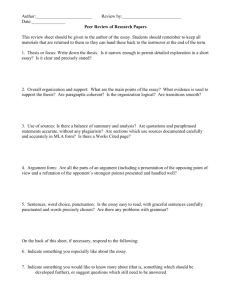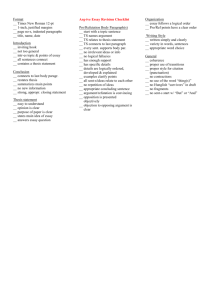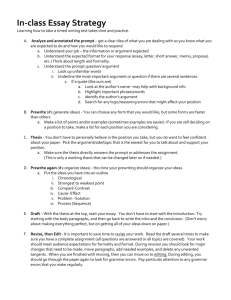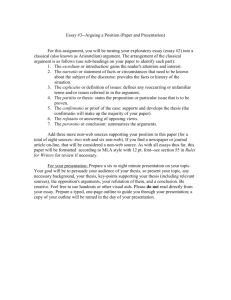Persuasive Essay Assignment
advertisement
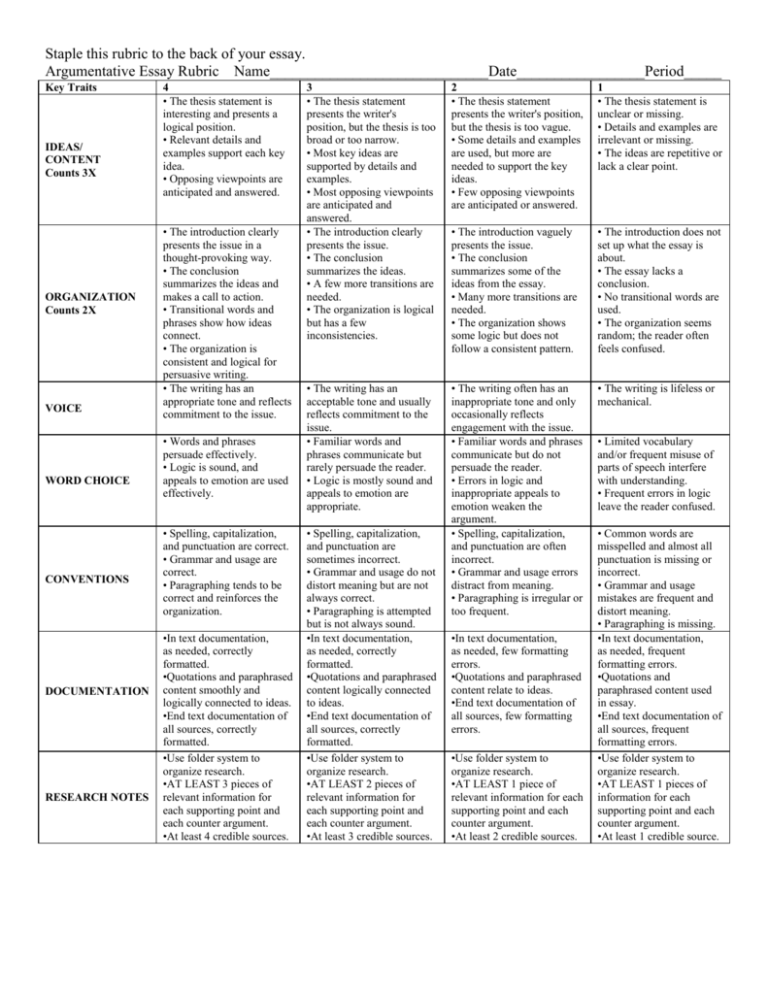
Staple this rubric to the back of your essay. Argumentative Essay Rubric Name_____________________________Date_________________Period_____ Key Traits IDEAS/ CONTENT Counts 3X ORGANIZATION Counts 2X VOICE WORD CHOICE CONVENTIONS DOCUMENTATION RESEARCH NOTES 4 • The thesis statement is interesting and presents a logical position. • Relevant details and examples support each key idea. • Opposing viewpoints are anticipated and answered. • The introduction clearly presents the issue in a thought-provoking way. • The conclusion summarizes the ideas and makes a call to action. • Transitional words and phrases show how ideas connect. • The organization is consistent and logical for persuasive writing. • The writing has an appropriate tone and reflects commitment to the issue. • Words and phrases persuade effectively. • Logic is sound, and appeals to emotion are used effectively. • Spelling, capitalization, and punctuation are correct. • Grammar and usage are correct. • Paragraphing tends to be correct and reinforces the organization. •In text documentation, as needed, correctly formatted. •Quotations and paraphrased content smoothly and logically connected to ideas. •End text documentation of all sources, correctly formatted. •Use folder system to organize research. •AT LEAST 3 pieces of relevant information for each supporting point and each counter argument. •At least 4 credible sources. 3 • The thesis statement presents the writer's position, but the thesis is too broad or too narrow. • Most key ideas are supported by details and examples. • Most opposing viewpoints are anticipated and answered. • The introduction clearly presents the issue. • The conclusion summarizes the ideas. • A few more transitions are needed. • The organization is logical but has a few inconsistencies. 2 • The thesis statement presents the writer's position, but the thesis is too vague. • Some details and examples are used, but more are needed to support the key ideas. • Few opposing viewpoints are anticipated or answered. 1 • The thesis statement is unclear or missing. • Details and examples are irrelevant or missing. • The ideas are repetitive or lack a clear point. • The introduction vaguely presents the issue. • The conclusion summarizes some of the ideas from the essay. • Many more transitions are needed. • The organization shows some logic but does not follow a consistent pattern. • The introduction does not set up what the essay is about. • The essay lacks a conclusion. • No transitional words are used. • The organization seems random; the reader often feels confused. • The writing has an acceptable tone and usually reflects commitment to the issue. • Familiar words and phrases communicate but rarely persuade the reader. • Logic is mostly sound and appeals to emotion are appropriate. • The writing often has an inappropriate tone and only occasionally reflects engagement with the issue. • Familiar words and phrases communicate but do not persuade the reader. • Errors in logic and inappropriate appeals to emotion weaken the argument. • Spelling, capitalization, and punctuation are often incorrect. • Grammar and usage errors distract from meaning. • Paragraphing is irregular or too frequent. • The writing is lifeless or mechanical. • Spelling, capitalization, and punctuation are sometimes incorrect. • Grammar and usage do not distort meaning but are not always correct. • Paragraphing is attempted but is not always sound. •In text documentation, as needed, correctly formatted. •Quotations and paraphrased content logically connected to ideas. •End text documentation of all sources, correctly formatted. •Use folder system to organize research. •AT LEAST 2 pieces of relevant information for each supporting point and each counter argument. •At least 3 credible sources. •In text documentation, as needed, few formatting errors. •Quotations and paraphrased content relate to ideas. •End text documentation of all sources, few formatting errors. •Use folder system to organize research. •AT LEAST 1 piece of relevant information for each supporting point and each counter argument. •At least 2 credible sources. • Limited vocabulary and/or frequent misuse of parts of speech interfere with understanding. • Frequent errors in logic leave the reader confused. • Common words are misspelled and almost all punctuation is missing or incorrect. • Grammar and usage mistakes are frequent and distort meaning. • Paragraphing is missing. •In text documentation, as needed, frequent formatting errors. •Quotations and paraphrased content used in essay. •End text documentation of all sources, frequent formatting errors. •Use folder system to organize research. •AT LEAST 1 pieces of information for each supporting point and each counter argument. •At least 1 credible source. Your group must choose a topic based on a debatable issue. The topic you choose will do triple duty. It will be the topic you use to learn about internet research skills. You will “take a stand” and write a persuasive essay (with documentation) about it. You will debate the topic with your novel group. So what do you write about? Using your novel as inspiration, identify an idea/problem/issue that you can use to create a debatable topic to research, and debate. The difficult part will be focusing your topic enough so that you can be focused in your research and argument. See if you can find a current issue that relates to a concern in the novel. Debating a policy that attempts to address the concern could be an effective approach. Posing the topic as a question or as a potential policy may help you get started. Needs ideas to get you going? How about…. How much control or influence should the government have over the media? Is there a way to control bias in the media? Do we want to? How much personal freedom (or wealth or…) should the individual give up for the sake of his fellow citizens? (Rights of the individual vs. rights of the whole) Are we moving toward a Nanny state? Are we already there? Do we want to be? Which creates a stronger country: big government or self-reliance? What limits should be placed on speech? For safety’s sake? For equality’s sake? Should there be limits?(current issue HR 347) Does the Patriot Act infringe too much on personal freedom? Is it justifiable? Is a country justified in conducting a pre-emptive strike if it has been threatened? Who should determine if a group or party is creating revisionist history? Should this be a concern? How much should the government be allowed to influence/control family? Should limitations be placed on reality TV? Should the US use military drones? Banning words limits speech. Good? Bad? Any potential dangers?(Think politically correct, or the recent “Spread the word. End the R word”) Remember: Always consider the possibility of unintended consequences. April 16 Topic selection made. April 17 Media center: Ms. Rauch: research, documentation, and plagiarism. BRING RESEARCH FOLDER. April 18-19 Media center: research. (Have your research folder, note cards, and flash drive every day from this point on.) April 24-25 Media center: research/writing/dystopia project. April 30 Media center: paper/dystopia project/debate prep. May 2 Dystopia projects and novel test due. Hand in novels. May 7 Paper due. May 14 Begin debates.
